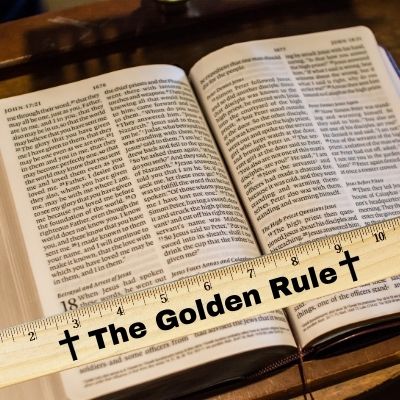
Every year, on the first days of school, in whatever grade I happened to be teaching, we set down our rules and expectations. Inevitably, as the students began to list how we were to behave, one of them would cite the “Golden Rule”. I’m sure you all can recite it with me…… (slide 1)
Of course, there are numerous variations to this rule. At my school, whose mascot was the “Otter”, our rule was often adapted to say, “Do unto otters, as you would have otters do to you” (slide 2)
Then there is the playground variation of the rule, which is more often how the students actually interpreted the rule, which was more like “do unto others like they do to you”, given the number of arguments and skirmishes that all of us teachers had to mediate during recess, However, there is another tongue in cheek variation called the tin rule, which is another the unspoken playground rule : (slide 3) (Do unto others before they do unto you)
Some people cite what is known as the “Silver Rule”, (slide 4) “Do not do unto others as you would not want done to you.” – This inversion of the Golden Rule reminds us to not do what we would prefer not to happen to ourselves. Essentially this is the negative version of the Golden Rule.
In addition to these, variations of this rule also exist among nearly all the world’s major religions and in their writings, including the Hebrew scriptures, which are the foundation for our Old Testament. Thus, in this morning’s gospel reading, when Jesus included this saying, he was not teaching his listeners anything new, but rather reminding them of the ordinance of God, recorded in the book of Leviticus (chapter 19:18b, for those who are interested in checking the reference).
Now that we’ve dealt with the verse in this passage that gets the most press, let’s step back and see what Jesus and the passage have to teaching us. According to Luke, Jesus has been teaching, preaching, and healing as he begins his ministry. Then, following a night of prayer on a mountainside, he descends to call together twelve of his disciples, “whom he also named apostles”. Let me digress here for a moment. While a disciple is a student, one who learns from a teacher, an apostle is sent to deliver those teachings to others. Literally, “Apostle” means messenger, one who is sent. Thus, an apostle is one who is sent to deliver or spread those teachings to others. … We can say that all apostles were disciples, but not all disciples are apostles. Therefore, when Jesus called these 12, he was inviting this circle of men to an additional calling; to not listen and learn, but to take what they are learning in preparation for spreading the message themselves.
Jesus then descends the mountain with his newly appointed apostles in tow and begins a new series of teachings in what is commonly referred to as the “Sermon on the Plain”, Luke’s parallel to the “Sermon on the Mount”, which includes his version of the Beatitudes. Our scriptures this morning continue these teachings that put the hearers on a level plain (or levels the socio-economic playing field) speaking to all those with whom Jesus has already spoken: the chosen twelve, the crowd of disciples and the “multitude” from all over the area.
Prior to our reading this morning, Jesus has been healing along with his teaching; therefore, the power that gives Jesus credibility with the masses has been demonstrated before this teaching even began. Meanwhile, we are told that “power came out of him” and healed everyone. Jesus has called upon the ancient words of his own scripture to attest to God’s continuing purposes, for which he has been anointed to carry out. All that power that flows from Jesus is about more than miraculous healing, this power is ultimately dedicated to and purposes to bring about a very different world, God’s world. This power will level the playing field now, as well as then, no matter what rules we have established to create and protect our positions.
After the blessings and woes of the beatitudes put those same purposes in memorable form, Jesus issues a call to take notice as he begins, “I declare to you who are listening.” Then he begins to describe the way in which those in covenantal relationship with God are called to live. And he begins to interpret the scriptures in such a way that very likely shook the very scriptural ground under his listener’s feet.
Sure, they knew the Golden Rule, and human nature being what it is, lived out some version of it. But Jesus wants his listeners to know – there is more! A lot more! He has a new version, a new spin on the classic saying. There is more to living out God’s will than simply treating others the way one wants to be treated. No, he is calling his followers to treat others the way that God would treat them.
Thus, Jesus quickly lists a bunch of plural imperatives that describe behavior for those still listening. The very first imperative, “love,” is followed by some quite concrete examples. Do good; don’t just think well of, but do good too. Pray for, bless, give, do. This is a constructive ethos of behavior that will be summed up in the concluding verse, as he charges them to be merciful, just as God is merciful. This is going to be the criterion by which Jesus’ followers will be judged and the answer to the questions about how one should live in God’s realm.
Those who follow Jesus (and that includes us, friends) are called to live as God lives: that is, mercifully and generous beyond expectation, beyond comprehension. For disciples, for God’s people, loving, lending, and doing good are all about generosity that does not draw boundaries based on the recipients’ responses, nor who the recipient is or where they came from. It is good to keep in mind that love in this passage is agape love, a love that expects nothing in return. It is a love that is about willing the good for another and then actually acting on that will.
Therefore, while Jesus includes” the golden rule” in his teaching, he is also emphasizing that it is insufficient for the “children of [God]”. One’s own wishes for oneself are no measure for one’s treatment of others. Rather, God’s mercy is to be the measure for God’s people’s behavior. Rather than emulating the behavior one wants to see in others and themselves, Jesus calls his followers to go the proverbial extra mile to demonstrate merciful behavior.
The concept of mercy as a hallmark in God’s kingdom is an important motif for this gospel writer. Early in his gospel narrative, Luke records Mary’s Magnificat, where God is twice identified as merciful. In Zechariah’s praise several verses later, he likewise speaks of God as merciful. That mercy, a sign of God’s faithfulness to God’s promises, creates a people who “might serve God without fear in holiness and righteousness”. All gifts flow from God’s “tender mercy” and fidelity to promises made. In Luke 6, we see that generous healing, restoration, and hope flow through Jesus. Jesus makes sure we who are listening know that it is our calling as well.
Showing mercy can be life-changing, regardless of whether one is the recipient or the giver. I would like to close with a classic tale of the transforming power of mercy. You may be familiar with this scene from Les Misérables:
Jean Valjean, having recently finished serving a long prison sentence for stealing bread (for his starving family), once again finds himself in desperate straits.
With nowhere to go on a rainy evening, he is offered shelter by the Monseigneur Bienvenu. With no money or work prospects, Valjean steals some silver from the parsonage, only to be caught by the local authorities.
Valjean is dragged back to the Monseigneur’s residence to be confronted for his wrongdoing. But instead of confirming the crime, Bienvenu sees the unfortunate event as an opportunity.
It is, with no exaggeration necessary, the opportunity to either condemn a life or to save one.
Employing distinctly atonement language, Bienvenu chooses the latter, and says to the stunned Valjean,
“Forget not, never forget that you have promised me to use this silver to become an honest man…. Jean Valjean, my brother: you belong no longer to evil, but to good. It is your soul that I am buying for you. I withdraw it from dark thoughts and from the spirit of perdition, and I give it to God!”
Let us live into God’s mercy. Amen.
